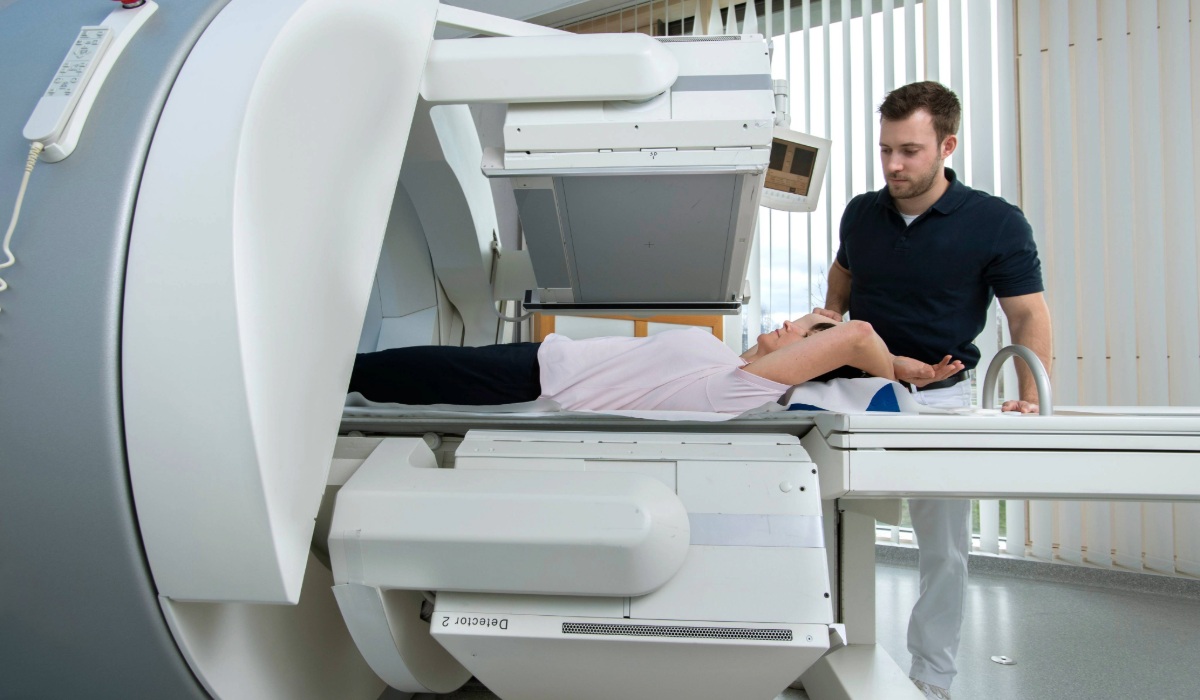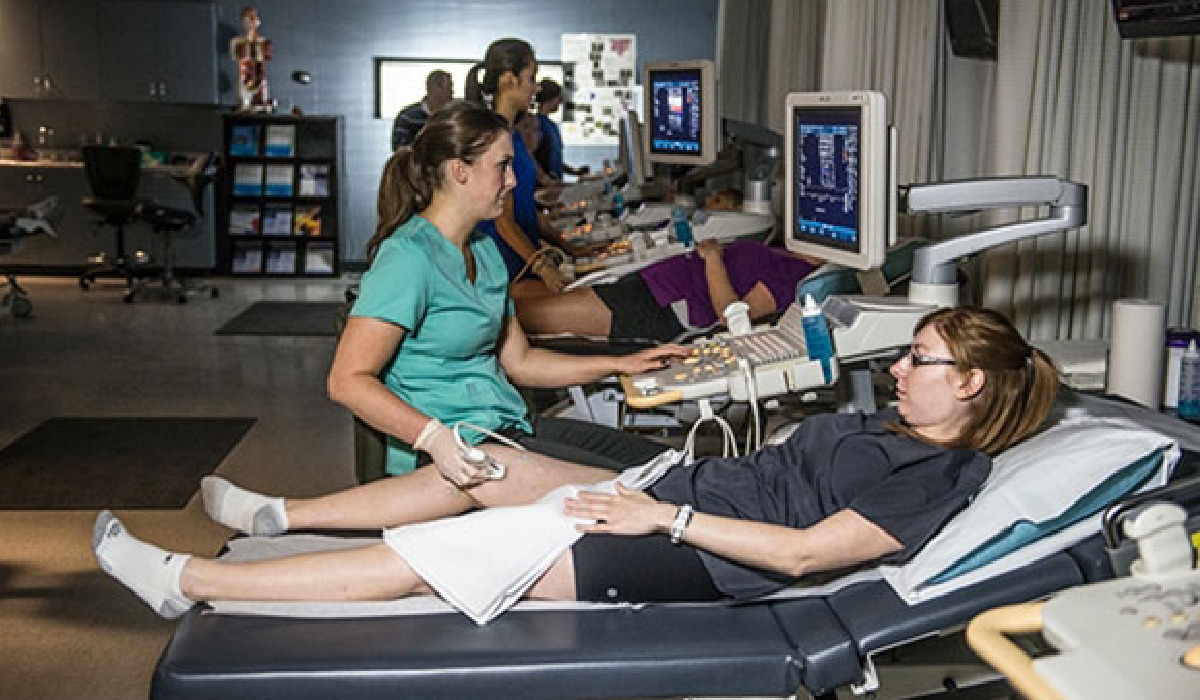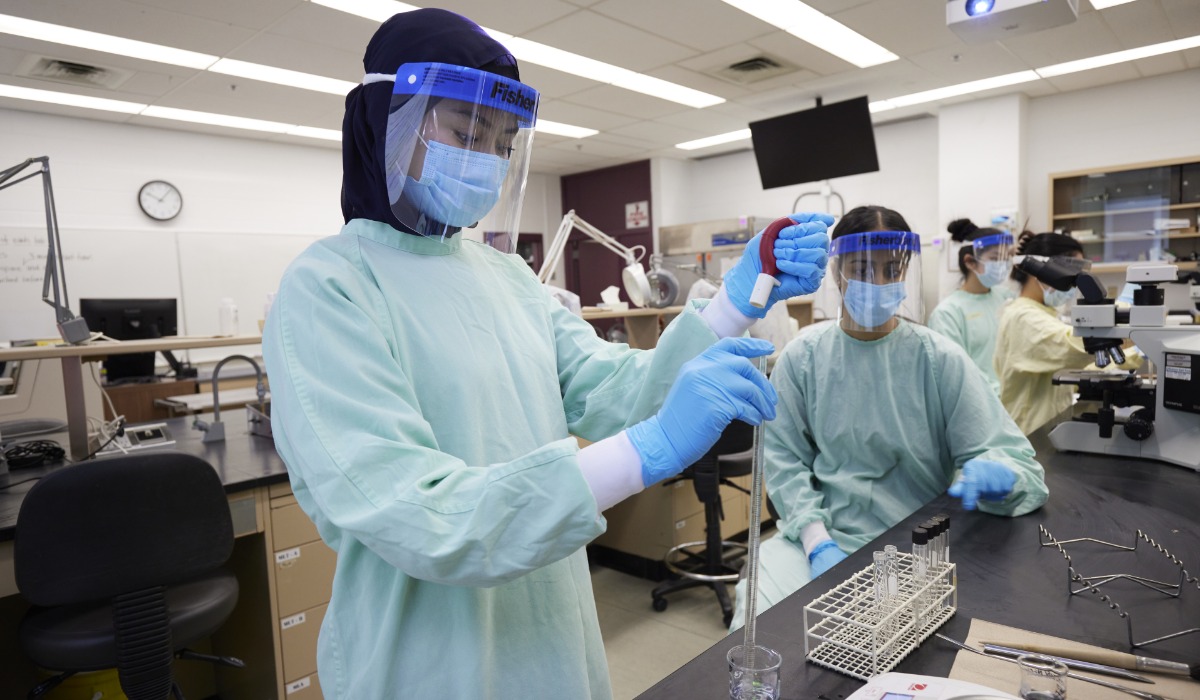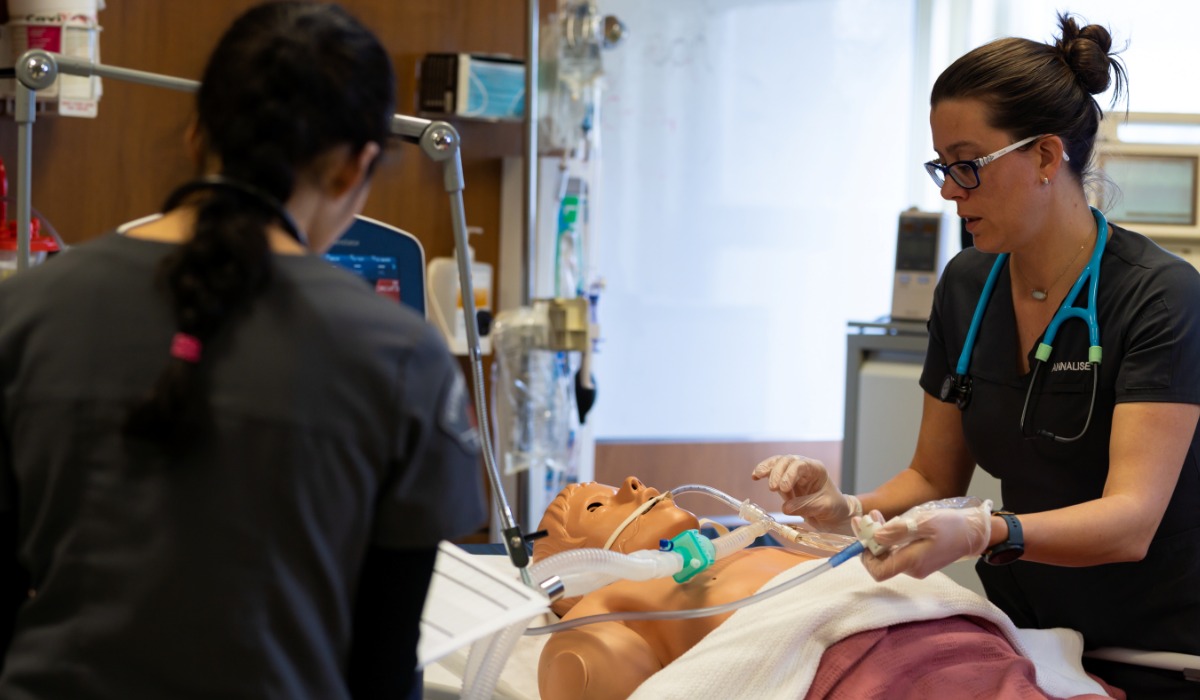Mandatory requirements
Applicants for this program are required to complete the School of Health and Public Safety entrance testing process as an admission requirement for this program by the set deadlines. Review admission requirements for more details.
Overview
Our Nuclear Medicine Technology program is an in-depth journey into nuclear medicine, focusing on diagnosing and treating diseases.
You will learn to use sophisticated diagnostic software and equipment and apply your skills in real-world clinical settings across various nuclear medicine departments.
As a student, you will:
- prepare and utilize radioactive drugs for imaging procedures
- develop skills to effectively communicate with patients
- learn ethical and professional standards in clinical settings
- learn the principles of radiation and radiology and how to protect yourself, patients and staff
- gain expertise in diagnostic CT imaging
- study the body systems and their functions
- gain an understanding of instrument measuring and imaging radioactivity
- learn how to perform patient imaging procedures and theranostics
- ensure the quality and safety of nuclear medicine equipment and processes
- learn how to perform blood draws, establish IV access and administer injections
- apply knowledge of pathophysiology as it relates to clinical procedures.
As a graduate who goes on to become certified and licensed, you'll find opportunities to work as a nuclear medicine technologist in diverse healthcare environments, including hospitals, community clinics, private laboratories, and research and teaching institutions.
If you want to contribute to providing positive patient outcomes and optimal patient care, this program is for you.
Those in nuclear medicine technology tend to be objective, methodical and innovative.
You need:
- fine motor skills
- a high degree of responsibility and integrity
- patience and flexibility
- sensitivity to the needs of ill and injured people
- good communication skills and the ability to put people at ease
- an interest in science and technology
- an eye for detail and accuracy
- good organizational skills
- good problem-solving and critical-thinking skills
- the ability to work well in a team setting
- the ability to manage stress well, maintain professional behaviour and regulate your emotions
- a desire for lifelong learning
- a tolerance for the sight of human blood and tissue
- to be physically able to assist in transporting, lifting, and positioning patients and equipment
- comfortable with performing patient care procedures which may be sensitive or performed in close proximity.
Nuclear medicine technologists wear personal protective equipment (PPE) for long periods. This includes exposure to latex and disinfection materials. They may also work extended hours and shift work, including nights and weekends.
You are strongly encouraged to refer to the ALIS website for career, learning, and employment information for nuclear medicine technologists to ensure you can successfully meet the occupational requirements for the program and profession.
You will complete required practicum placements during this program.
You will be assigned practicum placements with consideration given to your preference of location. However, due to limited availability in Calgary, it might be necessary for you to travel or relocate outside the city.
The healthcare field has a strong focus on health, wellness, and fitness to practice due to the demanding nature of the work and Occupational Health and Safety requirements. As such, special considerations will not be granted based on individual circumstances or preferences, except those stated as protected grounds when an accommodation has been approved.
In compliance with the practica agreements with our clinical partners, you will be required to provide specific documentation before you can participate in your practicum. Find out what requirements you need for this program.
Some seats in each intake of this program are reserved for applicants currently residing in Saskatchewan and Manitoba via our interprovincial health training agreements.
This program is accredited through Accreditation Canada, and meets the Canadian Association of Medical Radiation Technologists (CAMRT) national competency profile requirements. This program also works closely with our Diagnostic Imaging Provincial Advisory Committee.
Graduates are eligible to challenge the CAMRT certification exam, which is a requirement for registration and employment for registered nuclear medicine technologists in Canada. Graduates can also challenge the American Nuclear Medicine Technology Certification Board exam.
Upon successful completion of this program, you'll be awarded a SAIT Nuclear Medicine Technology diploma.
Careers and opportunities
Each year, SAIT conducts a survey between February and April to determine the employment rate, salary and satisfaction of our newest SAIT alumni.
![]() 100% graduate employment rate
100% graduate employment rate
![]() $73,993 average starting salary
$73,993 average starting salary
Find out more about our graduate employment statistics >
Our graduates may work in the following occupations. Some careers require additional experience and education.
Associated National Occupational Classification (NOC) codes: 32121.
Career planning support
Unsure which career path is for you? Here are some recommended career planning resources to help you decide your future.
You can also head to Alberta alis for lots of information about careers in Alberta, including quizzes and labour market information to help you narrow down a path.
Finally, you can take our online career finder quiz, which can help narrow your options based on your current skills and interests.
Courses
The Nuclear Medicine Technology diploma requires 72 credits (25 courses) to complete.
The program spans two and a half years.
| Course | Credits |
|---|---|
|
Anatomy and Physiology presents the structure and function of organs and systems in the normal human body, with a focus on physiology as it relates to nuclear medicine. |
3 |
|
This course introduces the chain of infection, and methods to reduce the risk of transmission of microorganisms to healthcare providers and patients. Topics include immunization, routine practice, contact and droplet precautions, sterilization and disinfection, safety, and the Workplace Hazardous Materials Information System (WHMIS). |
1.5 |
|
This course provides an overview of computed tomography (CT), basic principles of CT, equipment, image acquisition, reconstruction, and quality control. Emphasis will be placed on safety, patient care, assessment, and contrast administration. Pre-requisites:
Concurrent Prerequisite
|
3 |
|
This course covers routine computed tomography (CT) procedures and protocols along with the cross-sectional anatomy of the abdomen, chest, head, neck, pelvis, spine, and extremities. In addition, focus will be placed on identifying anatomical structures on various cross-sectional imaging planes. Learners will also cover CT imaging for interventional procedures. Pre-requisites:
|
3 |
|
This course explores the concept of research for allied healthcare workers, and reviews elements of the research process. Research methodologies applicable to healthcare will be examined, with topics including forming a research question, designing research strategies, critical thinking, and analyzing research data. Pre-requisites:
|
1.5 |
|
This course introduces the principles of quality assurance and their importance to the delivery of safe and effective nuclear medicine services. The focus of the course will be the requisite quality control for non-imaging systems. Pre-requisites:
Corequsites:
|
1.5 |
|
This course builds upon the concepts of quality assurance introduced previously in the program, with specific focus on the gamma camera system. This course covers the requisite quality control of both planar and SPECT/CT imaging systems, including computed tomography (CT) as it relates to nuclear medicine imaging. Pre-requisites:
|
3 |
|
This course introduces the procedures performed in nuclear medicine departments. Focus will be placed on integrating the theory of anatomy, physiology, radiopharmacy, and instrumentation into each specific procedure presented for the skeletal, gastrointestinal, cardiovascular, and endocrine systems. Pre-requisites:
Corequsites:
|
3 |
|
This course describes the current patient care practices and equipment used in the diagnostic imaging department. The learner will be introduced to techniques for performing safe patient transfers, evaluating and managing patient vital signs, recognizing and responding to patient emergencies, and obtaining and interpreting an electrocardiogram. An introduction to pharmacology, methods of pharmaceutical administration, and a variety of tubes, lines, and medical devices a technologist may encounter within the nuclear medicine department will also be presented. Pre-requisites:
Corequsites:
|
1.5 |
|
In this course, learners investigate nuclear medicine imaging using a gamma camera. Single photon emission computed tomography (SPECT) imaging, image acquisition and processing parameters are also discussed. A goal of this course will be to gain an understanding of factors that impact nuclear medicine image quality. Pre-requisites:
Corequsites:
|
1.5 |
|
This course completes the introduction to general procedures performed in nuclear medicine departments. Focus is placed on integrating the theory of anatomy, physiology, radiopharmacy, and instrumentation into each specific procedure presented for the genitourinary, central nervous and respiratory systems, as well as tumours, lymphatic, infection, and inflammation. The nuclear medicine technology practicum environment will also be introduced. Pre-requisites:
Corequsites:
|
3 |
|
In this course, you'll explore the foundational and practical training in nuclear medicine in preparation for practicum experiences. You'll examine the medical terminology specific to blood collection procedures, with an emphasis on safe venipuncture, intravenous therapy and infection control practices. You'll also focus on data production, radiopharmacy procedures and imaging protocols, as well as the safe handling of hazardous materials. Emphasizing professional integrity, critical thinking, and regulatory compliance, the course ensures that students are equipped with the skills to make informed, ethical decisions and uphold quality assurance in the industry. Pre-requisites:
Corequsites:
|
3 |
|
This course will provide learners with the fundamentals of positron emission tomography (PET) imaging. Learners are required to integrate anatomy and physiology knowledge as well as instrumentation and quality control concepts. Learners will examine PET system instrumentation, quality control, and radiopharmacy, as well as clinical PET procedures, related pathologies and image analysis. Pre-requisites:
|
1.5 |
|
This course provides opportunities to apply knowledge of general procedures performed in nuclear medicine, and builds on concepts previously introduced in the program. Focus is placed on image and data analysis, and abnormal results, for the skeletal, respiratory, cardiovascular, and endocrine systems. Common pathologies affecting these body systems will be presented as they relate to nuclear medicine. Pre-requisites:
Corequsites:
|
3 |
|
This course provides the opportunity to apply knowledge of general procedures performed in nuclear medicine, and builds on concepts previously introduced. Focus is placed on image and data analysis, and abnormal results, for the gastrointestinal, genitourinary, central nervous, tumour, lymphatic, and infection/inflammation systems. Common pathologies affecting these body areas will be presented as they relate to nuclear medicine. Pre-requisites:
Corequsites:
|
3 |
|
This course provides a review of theory material in preparation for the Canadian Association of Medical Radiation Technologists (CAMRT) certification exam. Pre-requisites:
Corequsites:
|
3 |
|
This course provides an introduction to radiopharmacy. Laboratory procedures are reviewed and the equipment and regulations used in radiopharmacies are introduced. Topics included are the production of radionuclides, the production and quality control of the eluate, and patient dose preparation. Corequsites:
|
1.5 |
|
Radiopharmacy 2 provides learners with the opportunity to continue with their development of requisite knowledge and skills for working in a radiopharmacy environment. Focus will be placed on the preparation of, and quality control for, radiopharmaceuticals used for diagnostic and nuclear medicine therapeutic procedures. Laboratory management skills will also be applied and practiced. Pre-requisites:
Corequsites:
|
3 |
|
This course introduces the characteristics of radioactivity and methods of detection. Topics include the structure of the atom and nucleus, radioactivity and related calculations, modes of decay, interaction with matter and radionuclide detectors used in nuclear medicine. Corequsites:
|
3 |
|
This practicum course provides an orientation to clinical practice, integrating theory with application. Emphasis is placed on ensuring professional behaviour, providing excellent patient communication, demonstrating patient care skills, working safely, and following protocols. Pre-requisites:
Corequsites:
|
6 |
|
This second practicum course provides learners with further opportunities to apply theory in a professional setting. In addition to skills developed during previous rotations, emphasis will be placed upon competency attainment, managing personal work-flow, and ensuring accuracy. Pre-requisites:
|
6 |
|
Practicum 3 is the workplace experience in which the learner completes all required competencies to qualify as practice-ready. In addition, focus will be placed on contributing to a team and proficiency development. Pre-requisites:
|
6 |
|
This course introduces essential skills for diagnostic imaging professionals. Interaction with patients, healthcare environments, and teams will be discussed. Professional standards, behaviours, and legal and ethical requirements are also addressed. Focus will also be placed on communication in the evolving healthcare environment. |
3 |
|
This course prepares you for your clinical practicum, focusing on the principles of effective delivery of care in nuclear medicine technology. You'll review and demonstrate the skills required to support personal and professional development, as well the necessary interpersonal and interprofessional collaboration skills. You'll also take the time to identify and gather the tools you'll need to help ensure your success in the clinical environment. Pre-requisites:
|
1.5 |
|
This course introduces the fundamentals of radiation protection for nuclear medicine technology and computed tomography. Focus will be placed on regulatory requirements and protective practices that limit radiation exposure to both the technologist and the public. An overview of basic radiobiological concepts and radiation dosimetry for technologists and patients will also be covered. Corequsites:
|
3 |
Progression
You must attain a PGPA and/or a CGPA of 2.0 or better each semester and pass the prerequisite courses to progress through the program.
To qualify for graduation, you must pass all courses, attain a CGPA of 2.0 or better and complete course requirements within the prescribed timelines.
Review our grading and progression procedure >
Explore your options!
Some courses in this program are available through Open Studies. You can complete courses via Open Studies to get a head start on your education, reduce your course load once accepted into a credentialed program, or determine which career path best suits you before you fully commit.
You may also take courses for general interest or personal and professional development.
Admission requirements
Applicants educated in Canada
Applicants must demonstrate English language proficiency and meet the following requirements or equivalents, with a combined average of 75%:
- at least 70% in Math 30-1 or at least 75% in Math 30-2, and
- at least 70% in English Language Arts 30-1, and
- at least 70% in Chemistry 30, and
- at least 70% in Biology 30, or Physics 30, or Math 31
You must also achieve a mark of 50% or higher in the School of Health and Public Safety's entrance testing process.
SAIT accepts high school course equivalents for admission for applicants educated outside Alberta.
All applicants who were educated outside of Canada must demonstrate English language proficiency and provide proof they meet the program admission requirements outlined above with an international document assessment. Find accepted educational documents and assessment options.
SAIT may also accept courses completed at certain international post-secondary institutions.
Academic Upgrading
Missing an admission requirement for this program? Upgrade your prior education to help you receive admission into one of SAIT's career programs.
English language proficiency
All applicants must demonstrate English language proficiency prior to admission, including students educated in Canada.
Transfer agreements
At SAIT, we have created transfer agreements with partner institutions to allow you to earn course credits toward your SAIT program based on your previously completed credentials.
Transfer Alberta search tool
Use the Transfer Alberta search tool to see all transfer agreements between Alberta post-secondary institutions (including those with the University of Calgary, Mount Royal University and Bow Valley College.)
Search transfer agreements in Alberta
Credits that transfer into this program
Once you have been admitted to this program, please complete a transfer credit application.
Submit a transfer credit application
- Available credits:
- n/a
A select number of seats in this program are reserved for applicants who meet the program's admission requirements and are a resident of Saskatchewan.
Final selection recommendations may consider regional distribution in support of practicum sites.
- Available credits:
- n/a
A select number of seats in this program are reserved for applicants who meet the program's admission requirements and are a resident of Manitoba.
Final selection recommendations may consider regional distribution in support of practicum sites.
Transfer options for graduates
When you have completed this program, you may continue your education at a partner post-secondary institution. These transfer agreements include partnerships within and/or outside of Canada.
Credits this program transfers to
- Available credits:
- 69
Upon successful completion of this program, you can ladder into the third year of TRU's Open Learning Bachelor of Health Science program, provided you meet the admission requirements.
Available intakes
Fall 2026
Start dates:
- Domestic students: Open
-
-
Application deadline: March 31, 2026
-
- International students: Open
-
-
Application deadline: May 29, 2026
-
Costs
2025/26 tuition and fees
The following costs are effective as of July 1, 2025.
The estimated total cost of tuition and fees is based on the suggested schedule of study. Following a modified schedule will impact the fees you pay per semester and may alter final costs.
Domestic students
* You will not be eligible for the UPass in your third semester.
**.5 indicates a combination of full-time semester(s) and part-time semester(s) in the same academic year. In many cases, students are completing a practicum during their part-time semester. Part-time students are those taking less than nine (9) course credits in a semester. You are not eligible for the UPass during a part-time semester.
***Based on six months of health and dental benefits only.
The program total is based on the estimated amount you will pay if you enter this program during the 2025/26 academic year. The program total amount listed on your letter of admission may appear higher. This amount is your maximum tuition guarantee for the program. SAIT will not exceed this maximum, regardless of changes in tuition and fees between academic years.
* You will not be eligible for the UPass in your third semester.
**.5 indicates a combination of full-time semester(s) and part-time semester(s) in the same academic year. In many cases, students are completing a practicum during their part-time semester. Part-time students are those taking less than nine (9) course credits in a semester. You are not eligible for the UPass during a part-time semester.
***Based on six months of health and dental benefits only.
Books and supplies are approximately $2,600 in the first year and $1,200 in the second year.
This is a bring-your-own-device program with a standard computer hardware and software requirement. See the specific requirements on our computers and laptops page. A laptop (non-Android) or Apple tablet is required. A mobile phone is not a suitable alternative.
Find your booklist on the SAIT Bookstore's website. Booklists are created by semester and available approximately two weeks before classes begin.
Required uniforms and personal protective equipment (PPE)
The industry-approved PPE you'll need will be discussed during your first few days of classes.
You will also require a uniform for some classes, which includes:
- scrubs
- a white lab coat with full-length sleeves and at least mid-thigh length
- closed-toe and heel shoes, runners or duty shoes.
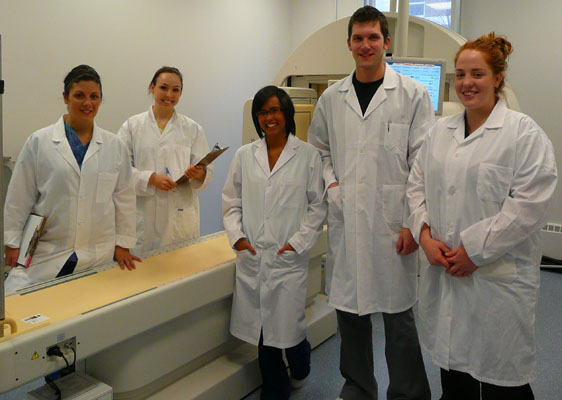
Additional fees
- A fee is associated with obtaining a police information check, including a vulnerable sector check, payable to the police or the Royal Canadian Mounted Police (RCMP).
- You must have your immunizations reviewed by the SAIT Health Clinic. There is a $75 charge to review vaccine history. Any vaccines you need to be administered will result in additional charges.
- A fee of approximately $50 to $100 is associated with an electronic student permit checking submission required for clinical practicum placements, payable to Synergy Gateway through the Verified software platform.
- A fee is associated with the CompTracker application used in this program.
- You are responsible for additional expenses related to your practicum, including pre-practicum requirements and relocation costs to practicum sites outside of Calgary.
- Nuclear Medicine Technology Certification Board (NMTCB) exam fees are approximately $175.
- Canadian Association of Medical Radiation Technologists (CAMRT) certification exam fees are approximately $840, with an additional exam administration fee.
- The Alberta College of Medical Diagnostic and Therapeutic Technologists registration fee is approximately $100.
Financial aid
Paying for your education may feel overwhelming, but we have resources and programs that can help, including information about payment options, student loans, grants and scholarships.
Application process
Before applying to this program, you must complete the necessary entrance tests.
Refer to Health and Public Safety entrance testing to find the required tests and deadlines and instructions on how to book your exams.
Ready to apply?
Follow our step-by-step guide to submitting a successful application.
Communication during admission
Email is the primary source of communication during the admission process. Ensure your personal email account is managed appropriately to receive our emails, files and communications.
We recommend you add hps.info@sait.ca domain to your safe senders' list or you risk missing critical email messages.
Begin your application
Apply now using the online application portal.
Ensure you have a valid Visa or Mastercard to pay the non-refundable application fee of $120 for domestic applicants or $175 for international applicants.
Information sessions
Prepare for a strong start in your chosen program or get the details you need to decide your future path.
Our expert staff and faculty are ready to answer your questions and provide information about the following:
- What sets SAIT apart
- An introduction to the program and area of study
- Admission requirements
- Future career paths
- Information on the earning potential and graduate employment rates.
Contact us
School of Health and Public Safety Advising
-
Email - hps.info@sait.ca
International Student Advising
-
Phone - 403.284.8852
-
Email - international@sait.ca
Subscribe for updates
Your journey starts here! Sign up to get important updates on:
- Health and medical programs
- Application information
- Relevant news and events

Oki, Âba wathtech, Danit'ada, Tawnshi, Hello.
SAIT is located on the traditional territories of the Niitsitapi (Blackfoot) and the people of Treaty 7 which includes the Siksika, the Piikani, the Kainai, the Tsuut’ina and the Îyârhe Nakoda of Bearspaw, Chiniki and Goodstoney.
We are situated in an area the Blackfoot tribes traditionally called Moh’kinsstis, where the Bow River meets the Elbow River. We now call it the city of Calgary, which is also home to the Métis Nation of Alberta.
